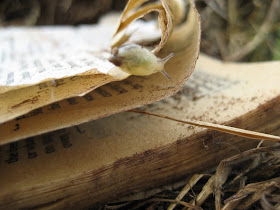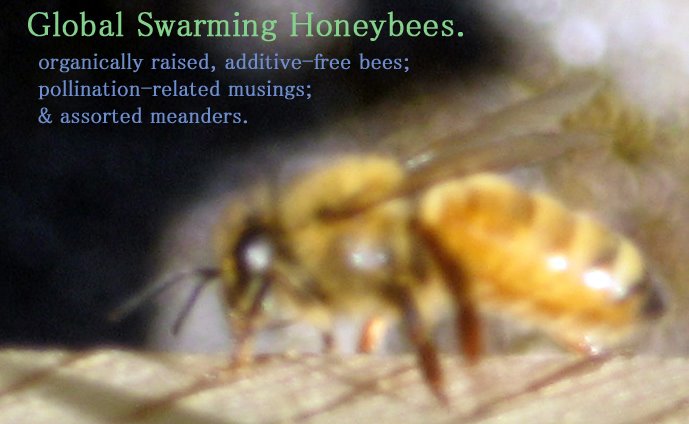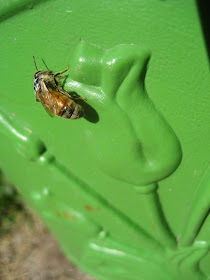Marvelous photos showcasing the extraordinary diversity of bees.
Take a look!
1.25.2011
Earthworms Deserve More Poems!
A friend recently asked me for a copy of this poem I wrote back in 1999, while at a writer's colony in Taos, New Mexico.
I'm glad she did, for I'd forgotten about it and was glad to be reunited with the strong pleasure I feel when I remember to take the time to commune with the worms. Earthworms are one of the many unsung heroes of the natural world. For gardeners, they're good friends, but all of us who eat are directly enriched by the work they do.
And so I hope you'll enjoy my poem, "Reward."
REWARD
You must first be willing to kneel before the meadow.
Align your ear to its uneven surface and you will hear
the wheezing earthworms below, rubbery locksmiths
tunneling through their monotonous dimension. You
will hear the mild sucking of the earth entering into them,
the rasping friction of soil undulating uneasily through
them, and its loose translation into unstrung
baby bracelets of aerated loam. Look around you,
for you are kneeling amidst a sea of worm-castings,
amidst their labor and its souvenirs.
Then smell the worked-over soil their bodies revise.
And in that scent, find the echo of the sound,
its manifestation: the world passed through
the earthworm’s body
a key in its keyhole,
music through its bell.
I'm glad she did, for I'd forgotten about it and was glad to be reunited with the strong pleasure I feel when I remember to take the time to commune with the worms. Earthworms are one of the many unsung heroes of the natural world. For gardeners, they're good friends, but all of us who eat are directly enriched by the work they do.
And so I hope you'll enjoy my poem, "Reward."
REWARD
You must first be willing to kneel before the meadow.
Align your ear to its uneven surface and you will hear
the wheezing earthworms below, rubbery locksmiths
tunneling through their monotonous dimension. You
will hear the mild sucking of the earth entering into them,
the rasping friction of soil undulating uneasily through
them, and its loose translation into unstrung
baby bracelets of aerated loam. Look around you,
for you are kneeling amidst a sea of worm-castings,
amidst their labor and its souvenirs.
Then smell the worked-over soil their bodies revise.
And in that scent, find the echo of the sound,
its manifestation: the world passed through
the earthworm’s body
a key in its keyhole,
music through its bell.
1.24.2011
Honeybee Exploring Metaphoric Flower
1.22.2011
Honeybee Visiting Chive Blossom
1.20.2011
Self-Portrait With Bees (A Poem)
SELF-PORTRAIT WITH BEES
Entering the hive
is like falling down a black velvet staircase.
Off come the gloves, the hat, the veil.
Proudly, I pose for my portrait with sweetness,
my portrait with pain.
Entering the hive
is like falling down a black velvet staircase.
Off come the gloves, the hat, the veil.
Proudly, I pose for my portrait with sweetness,
my portrait with pain.
1.19.2011
My Compost, Myself.
Awhile back, I wrote this mini-essay for a literary calendar project a friend of mine was putting together.
Today, in the snowy Catskills, I happened upon it and thought it might be fun to reprise it here. At this phase of the year, the tactile pleasure of handling earthworm-y compost is a fond memory, buried under a foot or so of snow; these days, a trip to empty the compost is a vaguely life-threatening battle with deep snow and icy patches.
I miss the sight, smells, and yes, sounds of robust mid-summer soil. In that spirit, herewith, alongside my freshly unearthed meditation on compost and poetry, are some "action shots" of my beloved compost pile taken over the past couple of years.
 In my compost pile at this very moment are: eggshells, a rotted zucchini, strawberry hulls, hot pink earthworms, fish bones, onion skins, hardworking ants, an old copy of The Joy of Cooking, aged cow manure (hauled in buckets from a farm pile 10 miles away where I force my girlfriend to take me every summer), deadheaded daffodils, weeds whose names I won’t bore you with, teabags, and the shredded drafts of old poems.
In my compost pile at this very moment are: eggshells, a rotted zucchini, strawberry hulls, hot pink earthworms, fish bones, onion skins, hardworking ants, an old copy of The Joy of Cooking, aged cow manure (hauled in buckets from a farm pile 10 miles away where I force my girlfriend to take me every summer), deadheaded daffodils, weeds whose names I won’t bore you with, teabags, and the shredded drafts of old poems.
I love the idea of my words returning to the earth, since the inspiration for much of my writing and more and more of my living is the world of nature. Compost Happens, says a popular bumper sticker, but I think of compost the way I think of poetry: a process of thoughtful addition, disciplined editing, experimentation, and alchemy. Just the right amount of attention is required: too little, and you get a cold pile of nothing; too much, and you overwork the magic. Words squirm together on the page and life is born, but if the artistic choices aren’t right, you wind up with a stinking anaerobic sludge.
Compost Happens, says a popular bumper sticker, but I think of compost the way I think of poetry: a process of thoughtful addition, disciplined editing, experimentation, and alchemy. Just the right amount of attention is required: too little, and you get a cold pile of nothing; too much, and you overwork the magic. Words squirm together on the page and life is born, but if the artistic choices aren’t right, you wind up with a stinking anaerobic sludge.
Like compost, writing should startle and surprise. My compost pile has revealed spotted salamanders, red-bellied snakes, handsome toad-elders, iridescent beetles, moles, voles, stupendously handsome red-bellied snakes, and luminescent worms so thin they’re barely there at all—each and every one of these animalitos de dios evoking a sense of gratitude and awe akin to the very best (and rarest) moments of creative pursuit. Like writing, compost is deep.
Bonus compost-sagas:
 Composted asparagus deciding it doesn't want to be compost. (Yes, I replanted it.)
Composted asparagus deciding it doesn't want to be compost. (Yes, I replanted it.)
 Composted almond deciding to give it a go.
Composted almond deciding to give it a go.
 A snail "riding the wave" of an old cookbook.
A snail "riding the wave" of an old cookbook.
Today, in the snowy Catskills, I happened upon it and thought it might be fun to reprise it here. At this phase of the year, the tactile pleasure of handling earthworm-y compost is a fond memory, buried under a foot or so of snow; these days, a trip to empty the compost is a vaguely life-threatening battle with deep snow and icy patches.
I miss the sight, smells, and yes, sounds of robust mid-summer soil. In that spirit, herewith, alongside my freshly unearthed meditation on compost and poetry, are some "action shots" of my beloved compost pile taken over the past couple of years.
 In my compost pile at this very moment are: eggshells, a rotted zucchini, strawberry hulls, hot pink earthworms, fish bones, onion skins, hardworking ants, an old copy of The Joy of Cooking, aged cow manure (hauled in buckets from a farm pile 10 miles away where I force my girlfriend to take me every summer), deadheaded daffodils, weeds whose names I won’t bore you with, teabags, and the shredded drafts of old poems.
In my compost pile at this very moment are: eggshells, a rotted zucchini, strawberry hulls, hot pink earthworms, fish bones, onion skins, hardworking ants, an old copy of The Joy of Cooking, aged cow manure (hauled in buckets from a farm pile 10 miles away where I force my girlfriend to take me every summer), deadheaded daffodils, weeds whose names I won’t bore you with, teabags, and the shredded drafts of old poems.I love the idea of my words returning to the earth, since the inspiration for much of my writing and more and more of my living is the world of nature.
 Compost Happens, says a popular bumper sticker, but I think of compost the way I think of poetry: a process of thoughtful addition, disciplined editing, experimentation, and alchemy. Just the right amount of attention is required: too little, and you get a cold pile of nothing; too much, and you overwork the magic. Words squirm together on the page and life is born, but if the artistic choices aren’t right, you wind up with a stinking anaerobic sludge.
Compost Happens, says a popular bumper sticker, but I think of compost the way I think of poetry: a process of thoughtful addition, disciplined editing, experimentation, and alchemy. Just the right amount of attention is required: too little, and you get a cold pile of nothing; too much, and you overwork the magic. Words squirm together on the page and life is born, but if the artistic choices aren’t right, you wind up with a stinking anaerobic sludge.Like compost, writing should startle and surprise. My compost pile has revealed spotted salamanders, red-bellied snakes, handsome toad-elders, iridescent beetles, moles, voles, stupendously handsome red-bellied snakes, and luminescent worms so thin they’re barely there at all—each and every one of these animalitos de dios evoking a sense of gratitude and awe akin to the very best (and rarest) moments of creative pursuit. Like writing, compost is deep.
* * * *
Bonus compost-sagas:
 Composted asparagus deciding it doesn't want to be compost. (Yes, I replanted it.)
Composted asparagus deciding it doesn't want to be compost. (Yes, I replanted it.) Composted almond deciding to give it a go.
Composted almond deciding to give it a go. A snail "riding the wave" of an old cookbook.
A snail "riding the wave" of an old cookbook.
1.11.2011
Bee Watching
How about a gorgeous slide show of New York City bees to get your wintry mind rolling in a summerly direction?


